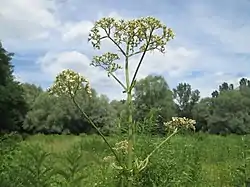Baldrian
German

Etymology
From Middle High German baldriān (also: waldriān, valdriān), from Old High German baldriān. Seemingly together with Hungarian bojtorján (“burdock”) (√ *boltorján) loaned in the Dark Age period from the late 6th to early 8th century from Turkic or Proto-Mongolic, the Pannonian Avars being direct neighbours of the Franks, cognate to Turkish بالدران / baldıran (“hemlock”) which see for more Turkic cognates.
Ultimately from Proto-Mongolic, reflected as
Middle Mongolian ᠪᠠᠯᠴᠢᠷᠭᠠᠨᠠ (balčirɣan-a, “false hellebore; angelica”), composed as ᠪᠠᠯᠴᠢᠷ (balčir, “infant; young, tender, fresh, rank”) + plant name suffix ᠭᠠᠨᠠ (-ɣana),
Mongolian балчиргана (balčirgana, “false hellebore; angelica”), composed as балчир (balčir, “infant; young, tender, fresh, rank”) + plant name suffix -гана (-gana)
Old High German had as another term for the valerian denemarka, denmarka, denemark, denimarka, in Middle High German denemarka, denemarcha, only retained in Alemannic German dialects, as tannenmark, tammarken etc.
The Medieval Latin valeriāna (“valerian”), from which the most widespread European names for the valerian derive, is most likely from German / Frankish, distorted after the verb valēre (“to be powerful”) or also the gentilic name Valerius – early enough to be calqued into Proto-Slavic *odolěnъ (“valerian”)
Pronunciation
- IPA(key): /ˈbaldriˌaːn/
Audio (file)
Declension
Descendants
Further reading
- “Baldrian” in Digitales Wörterbuch der deutschen Sprache
- Baldrian in Duden online
